Contenuti_italiano
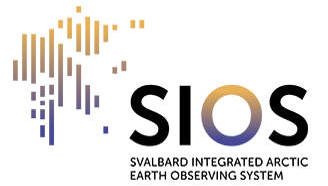 SIOS Svalbard Integrated Arctic Earth Observing System ha lanciato due call per il finanziamento di progetti scientifici in Artico
SIOS Svalbard Integrated Arctic Earth Observing System ha lanciato due call per il finanziamento di progetti scientifici in Artico
Di seguito i dettagli per ogni singola call
 SIOS Svalbard Integrated Arctic Earth Observing System ha lanciato due call per il finanziamento di progetti scientifici in Artico
SIOS Svalbard Integrated Arctic Earth Observing System ha lanciato due call per il finanziamento di progetti scientifici in Artico
Di seguito i dettagli per ogni singola call
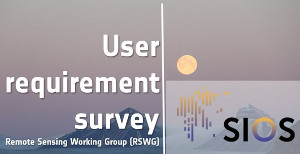 This User Requirement Survey has been formulated by the Remote Sensing Working group (RSWG) of the Svalbard Integrated Arctic Observing System (SIOS).
This User Requirement Survey has been formulated by the Remote Sensing Working group (RSWG) of the Svalbard Integrated Arctic Observing System (SIOS).
This survey aims to collect information on Earth Observation and Remote Sensing based data, geospatial products, information, and training requirements by the diverse Svalbard science community.
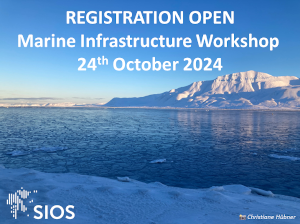 This a continuation of a popular series of SIOS workshops on marine infrastructure that began in 2020, and it offers the opportunity to connect with scientists working in the marine realm of Svalbard and learn more about Svalbard’s marine infrastructure. This workshop will present marine infrastructures and time series around Svalbard and will include an update on the Atlantic-Arctic Distributed Biological Observatory (A-DBO) as well as a presentation on the European Marine Biological Resource Centre. REGISTRATION
This a continuation of a popular series of SIOS workshops on marine infrastructure that began in 2020, and it offers the opportunity to connect with scientists working in the marine realm of Svalbard and learn more about Svalbard’s marine infrastructure. This workshop will present marine infrastructures and time series around Svalbard and will include an update on the Atlantic-Arctic Distributed Biological Observatory (A-DBO) as well as a presentation on the European Marine Biological Resource Centre. REGISTRATION
 The conference aims to:
The conference aims to:
- Provide a forum for those engaged in Earth System Science research in Svalbard - from Early Career Researchers to senior scientists - to share their latest results and network.
- Reduce the cost and environmental impact of conference participation.
- Review the state-of-the-art in Earth Observation and Remote Sensing applications in Svalbard.
- Demonstrate the breadth of Earth System Science research undertaken in Svalbard using remote sensing, fieldwork and modeling. MORE INFO
The aim of the online conference is to promote the work of PhD students, postdocs, researchers, senior scientists, and academics who are actively contributing to the science of Svalbard, to review the state-of-the-art Earth Observation and Remote Sensing applications in Svalbard and to provide a social experience to the Svalbard scientific community.
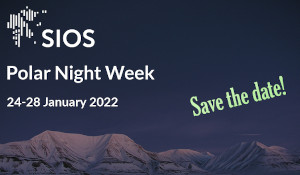 This annual meeting brings the SIOS community together for science seminars, working group meetings and plenary discussions. One of the highlights is the release of newest issue of the State of Environmental Science (SESS) report.
This annual meeting brings the SIOS community together for science seminars, working group meetings and plenary discussions. One of the highlights is the release of newest issue of the State of Environmental Science (SESS) report.
Updated: The fourth SIOS Polar Night Week (PNW) will take place online, 24-28 January 2022
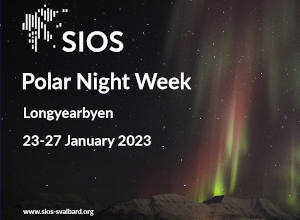 The fifth SIOS Polar Night Week (PNW) will take place in Longyearbyen, 23-27 January 2023.
The fifth SIOS Polar Night Week (PNW) will take place in Longyearbyen, 23-27 January 2023.
This annual meeting brings the SIOS community together for science seminars, working group meetings and plenary discussions. One of the highlights is the release of newest issue of the State of Environmental Science (SESS) report.
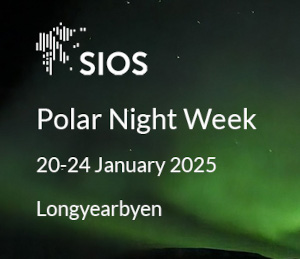 This annual meeting brings the SIOS community together for science seminars, working group meetings and plenary discussions. One of the highlights is the release of newest issue of the State of Environmental Science in Svalbard (SESS) report.
This annual meeting brings the SIOS community together for science seminars, working group meetings and plenary discussions. One of the highlights is the release of newest issue of the State of Environmental Science in Svalbard (SESS) report.
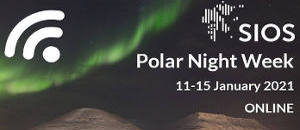 The third #PolarNightWeek for and with the #SIOS community will be held online, 11-15 January 2021.
The third #PolarNightWeek for and with the #SIOS community will be held online, 11-15 January 2021.
More...
SIOS Survey: Assessing impacts of COVID-19 pandemic on Svalbard science community
Written by Super User Svalbard Integrated Arctic Earth Observing System-Knowledge Centre (SIOS-KC) and its Remote Sensing Working Group (RSWG) has prepared a survey to understand the impacts of COVID-19 on the Svalbard science community, long-term monitoring programmes, and other field activities in Svalbard during 2020. This survey will be used to make a strategy for the upcoming (2021) field season in Svalbard. It will take approximately 15 minutes to complete this survey. The survey will be closed on 7th January 2021.
Svalbard Integrated Arctic Earth Observing System-Knowledge Centre (SIOS-KC) and its Remote Sensing Working Group (RSWG) has prepared a survey to understand the impacts of COVID-19 on the Svalbard science community, long-term monitoring programmes, and other field activities in Svalbard during 2020. This survey will be used to make a strategy for the upcoming (2021) field season in Svalbard. It will take approximately 15 minutes to complete this survey. The survey will be closed on 7th January 2021.
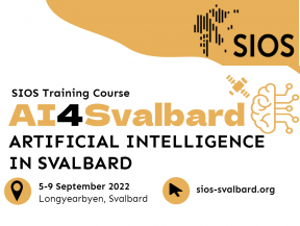 This autumn SIOS offers a training course on how to effectively use AI methods in Arctic Earth observation with special focus on research in Svalbard. The goal of the course is to teach participants the basic skills needed to use AI methods with Arctic Earth observation datasets. The training will be delivered by remote sensing experts from SIOS member institutions, international researchers, and experts from the industry. Official Site
This autumn SIOS offers a training course on how to effectively use AI methods in Arctic Earth observation with special focus on research in Svalbard. The goal of the course is to teach participants the basic skills needed to use AI methods with Arctic Earth observation datasets. The training will be delivered by remote sensing experts from SIOS member institutions, international researchers, and experts from the industry. Official Site
Time: 5 - 9 September 2022
 SIOS in cooperation with the National Research Council of Italy offers a training course on metrology in Svalbard. The participants will learn about general and applied metrology with special focus on data quality for environmental observations, WMO measurement guidelines, terminology and uncertainty evaluation prescriptions.The training course will cover specific aspects of metrology for instruments and observing sites in the Arctic. The training will be delivered by Prof. Andrea Merlone, Istituto Nazionale di Ricerca Metrologica, National Research Council of Italy.
SIOS in cooperation with the National Research Council of Italy offers a training course on metrology in Svalbard. The participants will learn about general and applied metrology with special focus on data quality for environmental observations, WMO measurement guidelines, terminology and uncertainty evaluation prescriptions.The training course will cover specific aspects of metrology for instruments and observing sites in the Arctic. The training will be delivered by Prof. Andrea Merlone, Istituto Nazionale di Ricerca Metrologica, National Research Council of Italy.
Registration deadline: 16 May 2022 - Register here
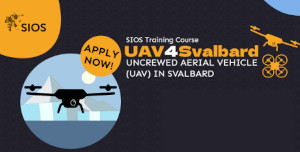 SIOS offers a training course on how to effectively use UAVs in Svalbard research.
SIOS offers a training course on how to effectively use UAVs in Svalbard research.
The goal of the course is to teach participants the basic skills needed to use UAVs in Svalbard.
Location: Longyearbyen, Svalbard
 Ministero dell'Universita e Ricerca
Ministero dell'Universita e Ricerca
Programma Ricerche Artico
Programma Nazionale di Ricerca in Antartide
 Ministero degli Affari Esteri e della Cooperazione Internazionale
Ministero degli Affari Esteri e della Cooperazione Internazionale
L'Italia e l’Artico
L’Italia e l’Antartide
CNR-ISP
Consiglio Nazionale delle Ricerche
Istituto di Scienze Polari
c/o Campus Scientifico - Università Ca' Foscari Venezia - Via Torino, 155 - 30172 VENEZIA MESTRE (VE)
Salvo diversa indicazione, il contenuto di questo sito è concesso in licenza : Attribuzione - Non commerciale - Condividi allo stesso modo 4.0 Internazionale (CC BY-NC-SA 4.0) 
Privacy policy e Cookie policy - Amministrazione trasparente CNR








